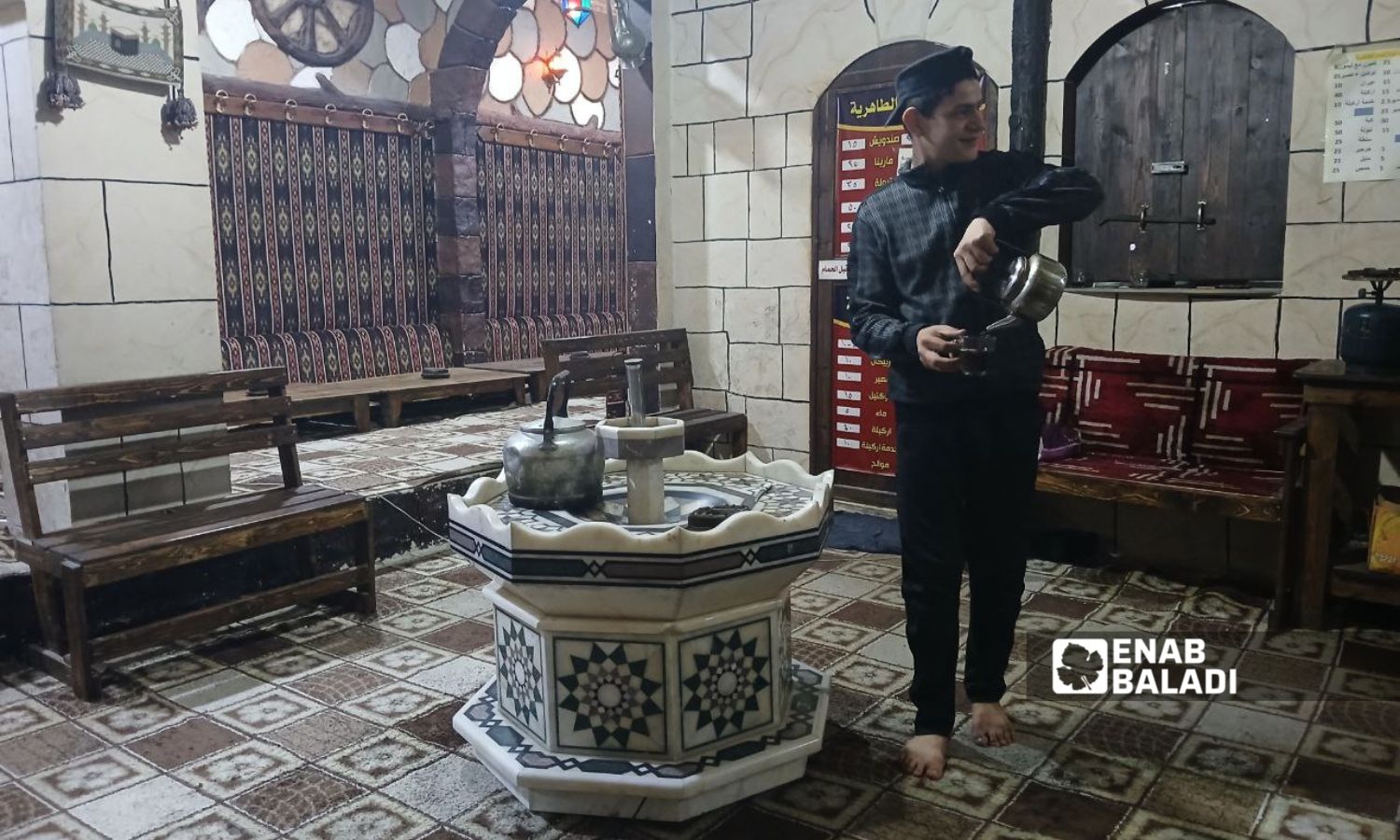



Idlib – Samah Alloush
Mukhtar Haider Ghreir, the owner of the Tahiriyah bath (hammam) in the middle of the Silaiba neighborhood in Idlib, maintains his investment in the project that he rehabilitated several years ago, striving to avoid the extinction of his family’s profession and to promote a popular culture that has been inherited in Syria for generations.
Ghreir faces the challenge of worsening economic and living conditions, which do not encourage many to visit the bath, as most people have come to consider the public baths a luxury, with visits limited to family celebration occasions such as “Tahoor” (purification) and “Taqmoosha” (the night before the wedding) and “Sabahiyah” (morning visit).
In the past, public baths were a refuge for families at the beginning of the winter season, as they sought to enjoy hot water at a low cost due to the absence of baths in their homes, which were only found in the houses of the affluent.
Today, despite the bath’s fee being relatively low compared to operating costs, at not exceeding 100 Turkish lira (three US dollars) per person, it has become beyond the reach of a large segment in Idlib as it equals the daily wage of a worker in light of many other necessities.
Regarding the Tahiriyah bath, Ghreir, or “Haiderah” as he is known in Idlib, stated that it is an archaeological masterpiece dating back about 120 years.
Ghreir began restoring the bath in 2020, after a closure that lasted about 50 years, since the 1980s.
After being refused by the Idlib Antiquities Directorate to demolish the bath—which spans an area of approximately 420 square meters—and construct other projects in its place, Ghreir decided to take the initiative and reopen it to residents wishing to experience a unique atmosphere of bathing, relaxation, and enjoyment reminiscent of a historic past.
After spending nearly 50,000 US dollars from the moment of reopening until now, the bath project has not succeeded as hoped.
Ghreir attributed the reasons to the deteriorating economic conditions and the inability of the Syrian Salvation Government (SSG) in Idlib to allow him to operate the bath for both genders (men and women), which has reduced the venue’s income and decreased the expected profits. Previously, a morning session was allocated for women, and an evening session for men.
Ghreir insisted on keeping the bath open 24 hours, summer and winter, without interruption, unlike the other four remaining public baths in Idlib from the ten that were once well-known in the city. However, he does not earn enough to support his project or to recover what was spent on renovation and changes made.
Additionally, in the winter, he is compelled to use firewood along with diesel heaters to warm the water and the spacious bath environment to ensure the best service for customers. This is coupled with the costs of filling water via tanks, as the bath does not have its own well.
The bath currently receives only men, and at the beginning of the renovation, the fee was 50 Turkish lira (equivalent to 5.5 dollars at that time).
With the depreciation of the Turkish currency, the fee was gradually raised to 100 lira in 2023, and it has remained the same this year to encourage customers and support the bath’s income, which employs 12 workers between scrubbing, service staff and “Beit al-Nar” (the furnace keeper), in addition to offering services like food, which is limited to grilled items and some hot eastern beverages.
Ancient public baths have maintained a cultural heritage that was traditionally recognized as an inn for those temporarily visiting the city, allowing those wishing to rest to sleep in the “Liwan” (a type of lounge) until morning, accommodating transient visitors and companions of patients in hospitals.
Enab Baladi has identified four historical baths that still exist in Idlib. Among them, two, according to local residents, have not opened this year, namely “al-Mahmoudiyah” and “al-Hashimiyah”, whereas “al-Rawdah” is expected to open in early November, and “Tahiriyah” remains operational.
Public baths are considered a cultural heritage for the Syrian people and are recommended by doctors for certain medical conditions for treatment in steam rooms (saunas) such as spinal diseases, stimulating blood circulation, and opening skin pores.
In past years, they were a destination for many displaced families to northern Syria to reclaim a fragment of their historical cities like Damascus, Aleppo, Homs, Hama, and others.
Before his death, researcher and historian Fayez Qusra told Enab Baladi that most restored baths in Idlib have not undergone any significant changes to their essence and artistic distribution derived from the Turkish bath, and that renovation processes have not utilized modern techniques for preserving the baths.
In contrast, the Tahiriyah bath has undergone cosmetic renovations to the exterior structure to repair the extensive damage it suffered over the past years, as noted by Qusra, considering these operations “scientifically acceptable,” as they did not alter the entire frontage of the bath and preserved its site and heritage value.
if you think the article contain wrong information or you have additional details Send Correction